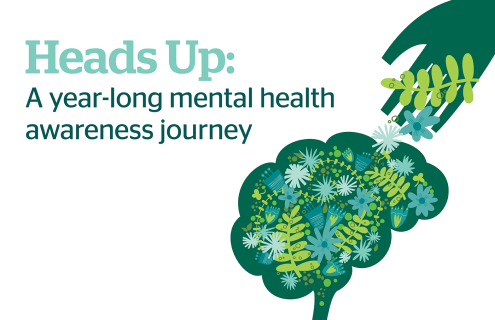
Every month, as part of a year-long effort to raise awareness of the issues and dispel the myths that lead to stigma, Dartmouth Health expert panelists and partners at the New Hampshire Union Leader and Seacoast Media Group have been focusing on different groups of people experiencing unique challenges to their mental health. This month, we look at the mental health challenges particular to our older adult population.
The loss of loved ones and friends, loss of independence, social isolation and the strain of caring for ailing partners are all common contributors to depression and anxiety among older adults, according to Ed Mahoney, PhD. Mahoney is a licensed psychotherapist at Bedford Counseling with an expertise in grief and loss and an educator with the Mental Health Center of Greater Manchester.
With the help of the community mental health center, a foundational grant and the Manchester City Library, Mahoney started a program called Storytelling: Remembering Together, which invites people aged 65 and older to gather and share personal stories about twice a month at the William B. Cashin Senior Activity Center in Manchester.
"It's just been an amazing experience, personally," Mahoney said. "I am an older adult myself. I'm in my 80s. So it's kind of a natural fit for me."
He said sharing stories offer a healthy outlet for processing a range of emotion. It's a chance to make new friends while triggering neurological benefits that are particularly helpful to people in the early stages of dementia. "What tends to happen is people begin to share and it just triggers other people's thoughts and stories," Mahoney said. "Meetings usually go for about an hour, and sometimes it's hard to end because people just want to keep talking."
The alternative of doing nothing, avoiding reaching out to loved ones for fear of "being a burden" or staying home and watching TV instead of a healthy routine of chores, hobbies and social activities can result in depression, according to Courtney Stevens, PhD, MA, a licensed clinical psychologist at Dartmouth Health who often works with the older adult population.
"How we spend our time—the activities we do or don't do—greatly affects our mood," Stevens said. "A storytelling group like this has the potential to benefit mental health because it gives folks an outlet for social connection, emotional validation and self-expression. Participating in activities that provide these inherently rewarding experiences acts like an anti-depressant."
Storytelling participant John, 65, agreed. John said he joined the group about a year and a half ago, during a time when he was feeling isolated due to COVID-19 and other personal circumstances.
"I found that being part of this group gave me a strong sense of community with other like-minded senior citizens who wanted to reach out and tell their stories," John said. "Dr. Ed Mahoney has been a very effective facilitator in motivating and encouraging us to share our experiences. He has had the ability to be able to draw memories and experiences from us that many had forgotten about and were able to expand upon because of the safe environment that he has created. I would recommend this group to anyone who may be interested in sharing their experiences with other senior citizens in the area."
While the group benefits participants' mental health, it is not set up as a clinical group therapy session. Older adult Phyllis Whitney said the conversational format makes the group more enticing to would-be participants for whom a stigma around 'therapy' might persist.
"The biggest barriers preventing older adults from seeking help for their mental health is a perceived societal stigma around these issues. Older adults are used to taking care of others, not being cared for or putting themselves first," Whitney said. "The storytelling group could help older adults understand their feelings and open up to others as they tell their stories. They may find their peers struggling with similar issues and group leaders can help older adults connect with appropriate resources."
The Storytelling: Remembering Together group has meetings scheduled for December 19, January 9, January 30 and February 13. More information is available at Manchester City Library website in the events page. Contact Sue Harmon at the library at sharmon@manchesternh.gov, or by phone at 603-624-6550 extension 7620 to register. People may also attend virtually via Zoom.
Mahoney, Stevens and Whitney explore the mental health challenges particular to our older adult population as panelists in a Heads Up webinar hosted by Dartmouth Health. It can be viewed online on our Heads Up: A Year-long Mental Health Awareness Journey web page.